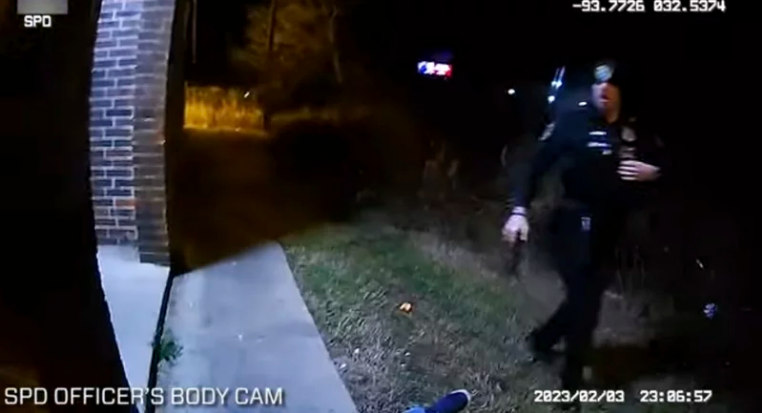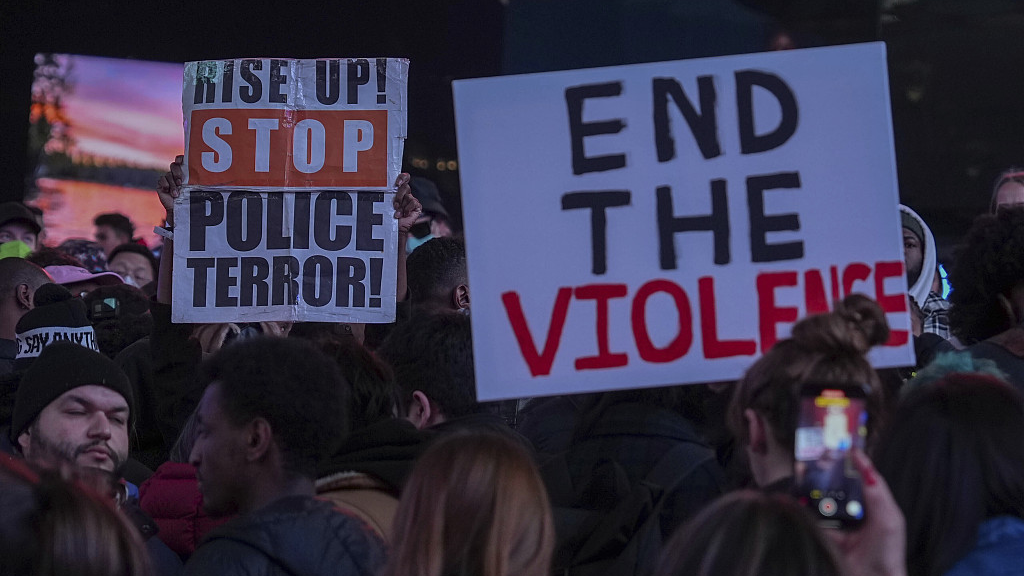
This photo provided by Louisiana State Police shows police body cam video of Shreveport Police Officer Alexander Tyler after shooting Alonzo Bagley on February 3, 2023. /AP
This photo provided by Louisiana State Police shows police body cam video of Shreveport Police Officer Alexander Tyler after shooting Alonzo Bagley on February 3, 2023. /AP
The United States is once again confronted with an all too familiar issue – police brutality – as a white Louisiana police officer was arrested on Thursday for fatally shooting an unarmed Black man.
After reviewing evidence and footage from officers' body-worn cameras, state troopers charged Shreveport Police Officer Alexander Tyler, 23, with negligent homicide in the death of 43-year-old Alonzo Bagley, who was trying to flee police responding to a domestic disturbance call earlier this month.
After receiving a 911 call from Bagley's wife who said her husband was "loaded on something" and threatening her and her daughter, Tyler and another officer arrived at the apartment, where Bagley opened the door holding a glass bottle with brown liquid.
According to the released body camera footage, Bagley said that he had to put away his dog, walked to the back of the apartment onto a balcony, jumped to the ground outside and ran. The officers then began chasing him.
"Upon rounding a corner of the building, Officer Tyler observed Mr. Bagley and fired one shot from his service weapon, which struck Mr. Bagley in the chest," Colonel Lamar Davis, the superintendent of Louisiana State Police, said at a news conference earlier this month.
In the video, Bagley can be heard saying, "Oh God, you shot me," as he slumped to the ground.

Demonstrators gather in Washington Square Park to protest the death of Tyre Nichols in New York City, U.S., January 28, 2023. /CFP
Demonstrators gather in Washington Square Park to protest the death of Tyre Nichols in New York City, U.S., January 28, 2023. /CFP
Police violence on the rise in U.S.
Several cases of police officers using excessive force on Black people in the United States over the years have been condemned by the public and led to calls for changes in policing.
Protests broke out globally following the May 2020 murder of George Floyd, a Black man who died after a white Minneapolis police officer knelt on his neck for more than 9 minutes, as well as other deaths during encounters with police officers.
Despite the protests, there are still many reports of violent law enforcement by the American police, especially against the African-Americans.
Two years after Floyd's death, the number of people who have died during interactions with police hit a 10-year high in 2022, at 1,186 deaths, according to the website of Mapping Police Violence, a non-profit database of police killings.
Among them, African Americans accounted for 26 percent, though they represent only 13 percent of the U.S. population.
Besides, data showed that over the past four decades, U.S. police have killed Black People at a rate 3.5 times higher than white people, according to a study by researchers from University of Washington.
The study also showed that the rate of fatalities from police violence rose even when the nation's overall homicide rate sharply declined, with the rate of deaths from police violence rising 38 percent from the 1980s to the 2010s.
(With input from agencies)